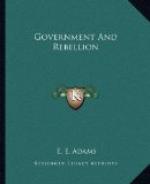Korah was a rebel and a traitor, who having, by intrigue, inspired some other leaders with the spirit of sedition, succeeded in drawing from their allegiance to Moses and Aaron, a large number of the people, who came together in a mob to demand a different administration. They were invited to refer the matter to the Divine decision, but they stoutly refused, accusing Moses of assumption, thus endeavoring to destroy his authority over the nation. That was rebellion. Again, in the reign of David, his son Absalom drew the people from their allegiance, then seized the reins of government and pursued his father with an army. That was rebellion against wholesome law, against the will of God.
Now we have the painful fact before us, that rebellion has sprung up against our good government. Men in many quarters have secretly plotted, and openly avowed hostility to our Federal Union. Eight of our States have passed the Ordinance of Secession, four or five others are assuming an attitude of hostility to the General Government, or refusing to comply with the Executive, who calls on them to aid in the defence of the Capital. This state of things has been preceded by acts of treachery on the part of leading men in the States, by seizure of arms, money, and public defences,—the property of the government. A new Confederacy is formed, contrary to oaths and compacts, for the purpose of destroying our Union, and giving perpetuity to slavery. It has attacked our forts, adulterated our coin, stolen our arms, proclaimed piracy against our commerce, set a price on the head of our Chief Magistrate, threatened our Capital, and raised armies to exterminate, if possible, our nationality. And all this it has done without one act of the Government to provoke such procedure; without any oppression; without any threat; but in the face of every honorable proposal on our part, after long and patient endurance of their encroachment and plunders; even until foreign journals deride us for our forbearance, and the rebels themselves insult our delay.
There are those who have compared this rebellion with our revolution of ’76. There could hardly be a wider distinction, both in principle and in fact, than between these two movements. The Colonies, had been oppressed by “navigation laws,” intended by the British Parliament to crush out their commerce for a whole century, from 1660 to 1775. Their weakness during that period did not allow of resistance. They were taxed oppressively, while they were not allowed a representation. This was in violation of Magna Charta; for the government of Great Britain was representative. Having been aided by the Colonists during the Seven Years’ War, in the subjugation of Canada, the Parent Government—without asking taxation through the regular action of the Colonial Government—assumed the right to tax our expanding commerce, and commenced a vigorous enforcement of revenue laws. “Writs of Assistance” were issued, whereby officers of the king were allowed




